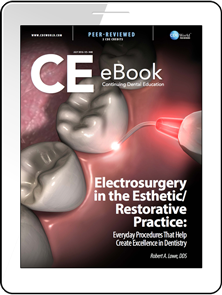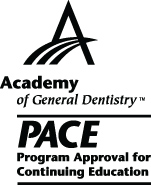CDEWorld > eBooks > Electrosurgery in the Esthetic/Restorative Practice: Everyday Procedures That Help Create Excellence in Dentistry


ADA CERP is a service of the American Dental Association to assist dental professionals in identifying quality providers of continuing dental education. ADA CERP does not approve or endorse individual courses or instructors, nor does it imply acceptance of credit house by boards of dentistry. Concerns or complaints about a CE provider may be directed to the provider or to ADA CERP at www.ada.org/cerp/

Approved PACE Program Provider. FAGD/MAGD credit. Approval does not imply acceptance by a state or provincial board of dentistry, or AGD endorsement. 1/1/2023 to 12/31/2028. ID # 209722.
eBook
Released: Tuesday, July 26, 2016
Expires: Sunday, June 30, 2019
Electrosurgery in the Esthetic/Restorative Practice: Everyday Procedures That Help Create Excellence in Dentistry
By Robert A. Lowe, DDS
Commercial Supporter: Parkell
Used in dentistry for more than a century, electrosurgery has long been an effective soft-tissue cutting method that offers a variety of applications for clinicians. Among its uses are tissue management, frenectomies, gingivectomies, lesion removal, and more. This article reviews advantages and disadvantages of electrosurgery and presents a variety of clinical examples of how it can be utilized to achieve successful outcomes in periodontal and general restorative procedures. Several major indications for electrosurgery are examined and illustrated.
LEARNING OBJECTIVES:
-
Identify common uses and major indications for electrosurgery in dentistry
-
Discuss advantages and disadvantages of using electrosurgery for cutting soft tissue
-
Explain the use of electrosurgery with respect to the biologic width
About the Author
Robert A. Lowe, DDS
Private Practice, Charlotte, North Carolina


